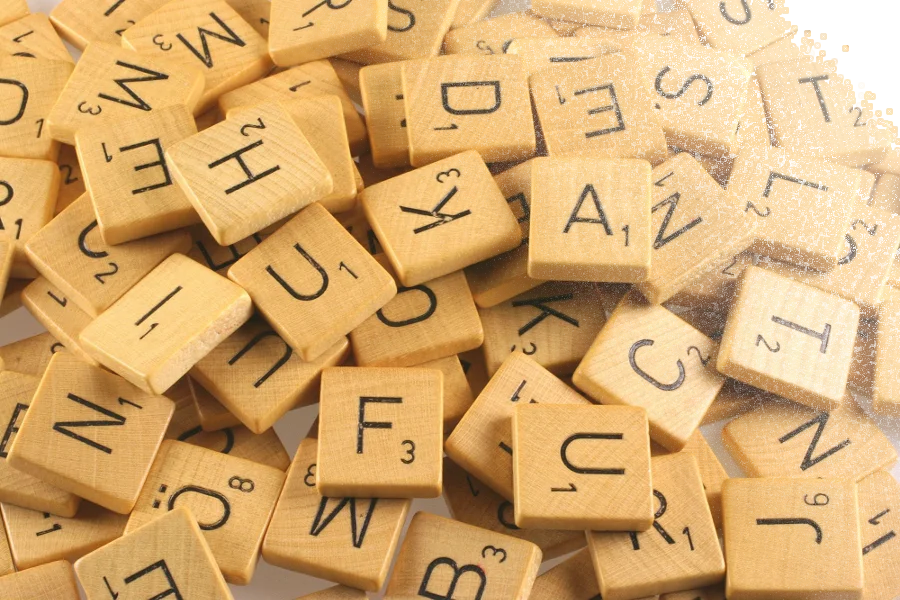Didja know the French Scrabble Champion was, for a time, a guy who can’t speak French?
His name is Nigel Richards. He’s real good at Scrabble. In order to compete in French Scrabble, he memorised the French Scrabble Dictionary over nine weeks. He knows all the words that are valid moves, and doesn’t speak any French at all. And this might seem like a remarkable thing, at first, but I tell you this not to be awed by Nigel Richards — though I mean, you should be impressed, the dude is good at Scrabble — but rather to get you to think about Scrabble.

About what Scrabble’s not, and how to see how being good at Scrabble would change you.
As far as games go, Scrabble is one that lures you in with a promise. In much the same way Pictionary suggests to you that it’s a game about being able to draw, Scrabble is a game that at least indicates it’s a game about spelling. Certainly when I was a little kid, I approached Scrabble as a game that was hard, because spelling words was hard, and sometimes there’d be all sorts of times I’d get the tiles and I couldn’t make any words with them.
And like, Scrabble is a game that tells you it’s about words, and it kinda is. You need to be able to spell words correctly. But the words themselves don’t mean anything to the game. A diverse vocabulary isn’t that important, a mastery of language isn’t a big deal, right?
Players of scrabble at the grandmaster level are people who have the toolkit of all the words they can use easily at hand. A mastery of the meaning of the words, an understanding of how to wield them, that’s irrelevant – it really is just a matter of seeing the letters in terms of configurations that score you points and control spaces. Short words have value because of what they can fit against, ways to ditch the challenging letters
I’ve talked about how if you play Scrabble and increase in skill, it eventually becomes a game about area control. But how do you get to increase in skill? Can you see this experience without dedicatedly working to memorise a dictionary? And if so, how would you go about doing that?
To make sure you understand what’s going on here, though, I need to teach you something of the rules of Scrabble. There’s stuff you probably know already — the obvious rules that the board has marked squares that influence your scores. You can change tiles as your turn, taking any tiles and ditching them, replacing the tiles in your rack. Any time you think someone has played a word that’s not real, a ‘phony,’ then the judges check that word. If the word is invalid, it’s taken off the board and its player loses their turn, and if the word is valid, the person who challenged it loses their turn without making a play. Also, and most significantly for this, if you have a full rack of tiles, seven, and can play a word that uses all the letters in your rack, then you get a bonus to your score. This is known as a Bingo, and its permutations and derivations are in the language of the game. For example, some racks can be described as ‘bingoey’ or ‘bingoless’ because of how likely they are to generate bingos.
Bingos are so important that, in any given turn where you can bingo, there is almost no chance that your best option is not to bingo. There are situations where you can bingo in multiple ways, and there may be better or worse bingos, but the score you get out of bingo, and the space they consume are both such important resources that by default: You Always Bingo.
And bingoing feels cool!
Here then is my proposal: Play Scrabble with a scrabble solver. Play it against someone else with a scrabble solver too. Just something that makes the vocabulary element of Scrabble irrelevant. There are a lot of these tools, and there are even tools that build it into the interface of a scrabble game.
Here’s what I expect to happen.
First, you and your opponent are going to have a couple of games that are absolute slugfests. Just absolute beastly moves against one another. You’ll be bingoing over and over again, whenever it’s available, especially because you’ll both be trying to make long, spanning words, which tends to open up space for other kinds of bingos. Any time a rack doesn’t yield a bingo, you’re going to struggle with what to do, and you’re always going to play in fear of your opponent having a better rack than you. Scrabble goes from a game of memorisation of options to a game of chance, hoping you get the best rack.
Then one of you is going to realise that those non-haymaker turns are best spent using small words to ruin placement for other bingos. You don’t want to give up good letters for them, things that you’ve learned are good for setting up other Bingos, or the tiles that are good for scoring.
Eventually, you’ll see the game as this sequence of movements; sometimes you’re trying to give as little as possible, and sometimes you’re trying to explode onto the board. It is footwork and lunges. It is craft and it is position.
It’s a shame it’s hard to see, if you’re not already doing a lot to be good at Scrabble. The vocabulary of scrabble, the intricate combinations of letters, that’s all part of the game that rewards mastery depth… and the depth is a literal dictionary of moves.
All of this is essentially, a form of house rules that are designed to expose a Scrabble surface you might not be familiar with. You can get the same effect by watching the best play, but watching real humans interact with the tiles introduces a lot of potential for failure. Really good players – even the best players – still make mistakes, missing words and places to put them.
This is an attempt to make a different game out of Scrabble. And then when you’re done playing it this way… you can take those same skills back to examine it in its more neutral state, with an appreciation for how the game is transformed… on the far side of the dictionary.



2 Comments
@updates have you played Qwirkle? It was explicitly designed to be a language-free Scrabble.
@updates i think he speaks a /little/ french.